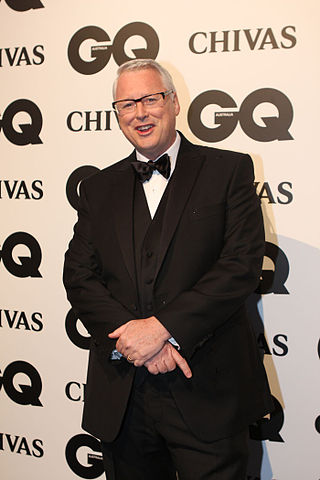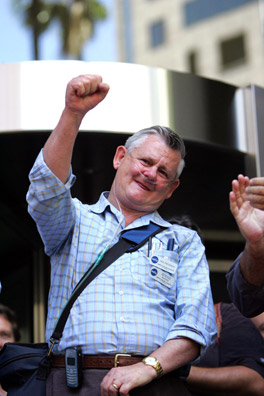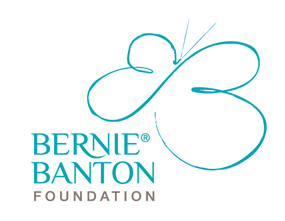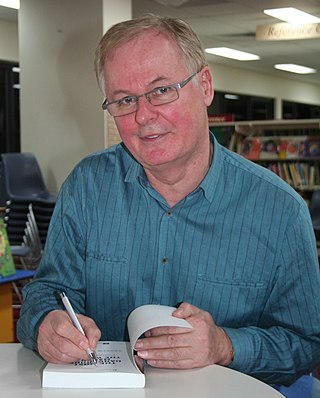Related Research Articles
James Hardie Industries plc is a global building materials company and the largest global manufacturer of fibre cement products. Headquartered in Ireland, it is a dual-listed company, being listed on the Australian and New York Stock Exchanges. Its management team currently sits in Chicago, Illinois, United States. James Hardie was plagued by several asbestos-related scandals in the 20th century.
The Gold Walkley is the major award of the Walkley Awards for Australian journalism. It is chosen by the Walkley Advisory Board from the winners of all the other categories. It has been awarded annually since 1978.

Marian Wilkinson is an Australian journalist and author. She has won two Walkley Awards, and was the first female executive producer of Four Corners. She has been a deputy editor of the Sydney Morning Herald, a Washington correspondent for The National Times, The Age and The Sydney Morning Herald, as well as a senior reporter for The Australian.As of April 2017, she is a senior reporter at Four Corners.

Stan Grant is an Australian journalist, writer and radio and television presenter, since the 1990s. He has written and spoken on Indigenous issues and his Aboriginal identity. He is a Wiradjuri man.

George Edward Negus AM is an Australian journalist, author, television and radio presenter specialising in international affairs. He was a pioneer of Australian TV journalism, first appearing on the ABC’s groundbreaking This Day Tonight and later on Sixty Minutes. Negus was known for making complex international and political issues accessible to a broad audience through his down-to-earth, colloquial presentation style. His very direct interviewing technique occasionally caused confrontation, famously with Margaret Thatcher, but also led to some interviewees giving more information than they had given in other interviews. Recognition of his unique skills led to him hosting a new ABC show, Foreign Correspondent, and Dateline on SBS. He often reported from the frontline of dangerous conflicts and described himself as an “anti-war correspondent” who wanted people to understand the reasons behind why wars were senseless. He was awarded a Walkley Award for Outstanding Contribution to Journalism. He presented 6.30 with George Negus on Network Ten. He remains a director of his own media consulting company, Negus Media International.
Catherine Ellen Martin was a journalist for The West Australian newspaper from 1957, specialising in medical reporting. The winner of the inaugural Gold Walkley, Martin is known for her reporting the impact of asbestos–related diseases on the mining community in Wittenoom Gorge that led to the company James Hardie being found in the Supreme Court of New South Wales guilty of misleading conduct and failing to meet its obligations over its handling of asbestos compensation.

Paul James Barry is an English-born, Australian-based journalist, newsreader and television presenter, who has won many awards for his investigative reporting. He previously worked for the BBC on numerous programs, before emigrating to Australia.
Monica Ann Attard is an Australian journalist and academic.

Anthony William Jones is an Australian television news and political journalist, radio and television presenter and writer.
Emma Alberici is an Australian journalist and former foreign correspondent who was the chief economics correspondent for the Australian Broadcasting Corporation's television network.

Bernard Douglas Banton AM was an Australian builder and, later, social justice campaigner for asbestos-related diseases. He was the widely recognised face of the legal and political campaign to achieve compensation for the many sufferers of asbestos-related conditions, which they contracted after either working for the company James Hardie or being exposed to James Hardie Industries' products.

Waleed Aly is an Australian television presenter, journalist, academic, and lawyer.
Graham Hunt Davis is a Walkley Award and Logie Award winning Fijian-born Australian journalist. He hosts a weekly Australian television program, The Great Divide on the Southern Cross Austereo TV Network, and is a consultant to the Washington-based global communications company Qorvis on its Fiji account.
Baryulgil is a rural locality in north-eastern New South Wales, Australia. The locality is on the Clarence River in the Clarence Valley Council local government area.

Killer Company: James Hardie Exposed is a 2009 Australian book by journalist Matt Peacock.
Devil's Dust is a two-part Australian television docu-drama mini-series on the ABC which first screened in 2012. Based on journalist Matt Peacock's 2009 book Killer Company, Devil's Dust was researched and developed by producer Stephen Corvini for over two years prior to the series' production. Through the factual case of Bernie Banton, it recounts the tragedy of many Australian workers and their families afflicted with asbestosis and mesothelioma in the twentieth-century asbestos mining and processing industries. Though the extreme health risks of exposure to asbestos dust had been documented for many years, manufacturer James Hardie persisted in large-scale use of the material, aided by inadequate regulation by state health agencies.

The Bernie Banton Foundation was an Australian not-for-profit organisation founded in June 2009 by its CEO, Karen Banton, the widow of Bernie Banton AM. It was an Australian national mesothelioma cancer, and other asbestos related diseases victim support and patient related advocacy organisation, offering and providing support in all Australian states and territories.

Laura Margaret Tingle is an Australian journalist and author.
Caro Meldrum-Hanna is an Australian investigative journalist.

Andrew John Fowler is an Australian TV reporter, author, and journalist. Born in the United Kingdom, he worked as a journalist in London before migrating to Australia. He specialises in human rights and national security issues.
References
- 1 2 3 Dan Harrison, "ABC elects staffer Peacock as director", Sydney Morning Herald (22 April 2013).
- ↑ Matt Peacock, "Aborigines and asbestos", New Scientist (29 March 1979), Vol. 81, No. 1148, p. 1020.
- 1 2 "ABC board member Matt Peacock confirms he is in 'redundancy pool'", The Guardian (26 November 2014).
- ↑ James Massola (23 June 2015). "'Whose side are you on?' Tony Abbott lashes ABC's Q&A program". Sydney Morning Herald.
- ↑ Michael Bodey, "ABC staff urged to stand strong against inflammatory campaign", The Australian Business Review (29 June 2015).
- ↑ Amanda Meade, "Asbestos drama highlights role of probing journalist", The Australian Business Review (29 October 2012).
- ↑ Kristin Demetrious, Public Relations, Activism, and Social Change: Speaking Up (2013), p. 60.
- 1 2 3 Angela Welsh. Review: Killer Company Archived 21 February 2011 at the Wayback Machine The Walkley Foundation, 27 October 2009.
- ↑ Matt Peacock. Australia's silent killer: James Hardie Archived 18 February 2011 at the Wayback Machine Evatt Foundation .
- ↑ Tim Elliott (8 November 2012). "Devil is in the detail". Sydney Morning Herald. Retrieved 14 March 2016.